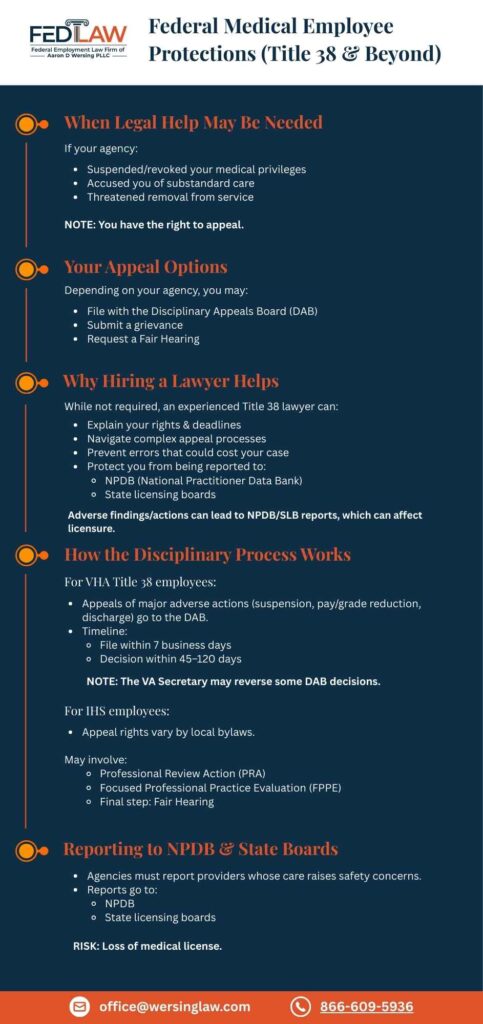
Whether you are a Department of Veterans Affairs Title 38 employee, or part of the Medical staff at another agency like IHS, you have a high level of responsibility for your patients and are given unique protections and appeals processes as a federal employee.
If your agency has suspended or revoked your medical privileges, accused you of providing substandard patient care, or is otherwise threatening you with adverse actions such as removal from federal service, there are legal options that can help.
Depending on your agency, you may be able to appeal to the Disciplinary Appeals Board (DAB), file a grievance, or request a fair hearing.
To learn what legal options may be available in your situation, contact a lawyer experienced with Title 38 and healthcare employees today.
Give us a call at (833) 833-3529 or send an online message today for assistance.

Do I Need a Lawyer as a Title 38 Employee?
As a Title 38 medical professional (such as a physician, nurse, dentist, or other credentialed provider employed by the Department of Veterans Affairs or Indian Health Service), you are not legally required to hire an attorney in order to file a complaint, grievance, or appeal. You may represent yourself in disciplinary proceedings or before a Disciplinary Appeals Board (DAB).
That said, the rules governing Title 38 adverse actions are unique and highly technical. They differ significantly from the standard Title 5 procedures that apply to most federal employees. For example, appeals may involve:
- Strict filing deadlines (as short as 7 business days for DAB appeals).
- Specialized procedures established by agency medical staff bylaws and federal statutes.
- Complex evidentiary rules, including witness testimony, clinical standards of care, and peer review records.
Because of these complexities, many employees choose to consult with an experienced federal employment attorney. A knowledgeable Title 38 lawyer can:
- Explain your rights and options under federal law and agency bylaws.
- Help you avoid procedural mistakes, such as filing in the wrong forum or missing a deadline.
- Prepare your case strategically, including gathering medical and employment records, witness statements, and expert testimony.
- Protect your professional reputation, particularly against risks such as reporting to the National Practitioner Data Bank (NPDB) or State Licensing Boards (SLBs) if an adverse action is sustained.
- Negotiate settlements or alternative resolutions that may prevent escalation of discipline.
- Represent you in federal court, if your case proceeds beyond the administrative process.
When selecting counsel, it is important to find an attorney with specific experience in Title 38 cases. These cases differ greatly from Title 5 or private-sector employment matters, and require a lawyer who understands the interplay between federal employment law, medical credentialing, and professional licensing.
In short: while hiring an attorney is not mandatory, having the right lawyer can make a critical difference in protecting both your career and your medical license.
How the Disciplinary Process Works
Each federal agency has its own processes for medical employees. For VHA Title 38 employees, you can appeal major adverse actions to the Disciplinary Appeals Board (DAB).
A major adverse action includes any of the following:
- Suspension,
- Transfer,
- Reduction in grade,
- Reduction in basic pay, and
- Discharge.
DAB appeals move rather quickly. An appeal to the DAB must be received within seven business days after the written decision on the adverse action.
The DAB must issue a decision within 45 days of the hearing, and not more than 120 days after the filing of the appeal.
It is important to note, however, that the Secretary can under certain circumstances, reverse or vacate the DAB’s decision. Other adverse actions can be appealed through the VA’s grievance procedures.
At other agencies, such as the Indian Health Service (IHS), appeal rights differ greatly. Appeal rights for members of the IHS medical staff follow local bylaws.
Generally, there is a Professional Review Action (PRA), which must be requested by a Director or Department Chief, and then a notification is sent to the affected staff member.
There is an ad hoc committee formed to informally review the employee’s patient care and, failing that process, there may be a Focused Professional Practice Evaluation (FPPE), where another member of the medical staff evaluates the employee’s ability to properly care for her patients.
Failing that, the employee may be removed, allowing her to request a Fair Hearing before a hearing committee.
Such a right is critical, as in many cases the agency does not properly perform the due process steps leading up to this point and this may be the affected employee’s first chance to defend herself.
Reporting to NPDB and State Licensing Boards
Regardless of your employing agency, if your professional conduct or competence is being wrongfully questioned, it is imperative that you appeal through the proper channels.
Agencies such as the Department of Veterans Affairs must report each licensed healthcare professional whose behavior or clinical practice so substantially fails to meet the generally accepted standards of clinical practice as to raise reasonable concern for the safety of patients.
These reports are sent to the state licensing boards in each state in which the employee is licensed, as well as the NPDB, and this reporting can lead to the loss of one’s medical license.
Consult a Title 38/Healthcare Lawyer Today
If you believe your professional conduct or competence is being questioned, you should speak with our attorneys who are skilled in the nuances of Title 38 and healthcare employee issues.
Don’t risk your license by attempting to handle the appeals process on your own.
To learn more about how a VHA Title 38 lawyer can assist you, contact the Federal Employment Law Firm of Aaron D. Wersing, PLLC or give us a call at (833) 833-3529 today.
We have years of experience helping federal medical employees. We understand how much is at stake when you are filing an appeal.
Let us protect your rights and help you fight for the outcome you deserve.
FAQs
Who qualifies as a Title 38 employee?
Title 38 employees are healthcare professionals (physicians, nurses, dentists, podiatrists, optometrists, and other credentialed providers) employed primarily by the Department of Veterans Affairs (VA). Similar rules may also apply to medical staff employed by the Indian Health Service (IHS) and certain other federal agencies.
What kinds of actions can I appeal as a Title 38 employee?
If your agency has suspended or revoked your clinical privileges, accused you of substandard patient care, or threatened adverse actions such as removal from federal service, you may have the right to appeal.
At IHS and other agencies, appeal rights vary based on medical staff bylaws and may involve internal review committees, Focused Professional Practice Evaluations (FPPEs), or Fair Hearings.
At the VA, major adverse actions (suspension, discharge, pay/grade reduction, or transfer) can be appealed to the Disciplinary Appeals Board (DAB).
What risks do I face if I lose my appeal?
If your appeal is unsuccessful, your agency may be required to report you to the:
- National Practitioner Data Bank (NPDB)
- State Licensing Boards (SLBs) in all states where you are licensed.
These reports can severely damage your professional reputation and may lead to loss of your medical license.
What happens if I’m reported to the NPDB or a State Licensing Board?
Reports to the NPDB or licensing boards may become part of your permanent professional record. This can:
- Impact your ability to practice medicine in the future.
- Affect credentialing at hospitals or federal agencies.
- Lead to license suspension or revocation.
This is why defending yourself properly at the earliest stage is critical.
What can a Title 38 lawyer do for me?
An experienced Title 38 attorney can:
Represent you in federal court if needed.
Explain your rights and filing deadlines.
Guide you through complex appeal processes.
Collect evidence, expert testimony, and records to strengthen your case.
Negotiate alternatives to adverse actions.
Protect your reputation and medical license.